Amazing BBQ Tri Tip that wins every single time! This goof-proof recipe is positively loaded with flavor and is perfect for sharing with friends and family. Whether you use a gas grill or a charcoal grill, this post provides instructions on how to grill tri tip on both.

We’re back with an Everything You Could Possibly Want to Know (and More) About Grilling Tri Tip tutorial!
Look, grilling food is simple, but like anything, there are many shades of badassedness.
Mastering the art of grilling guarantees you will always have an amazing meal to look forward to.
Even when Murphy’s Law is having its way with you.
Grilled steaks are something to celebrate in my household, and if you’re anything like us, bbq tri tip is an epic source of excitement.
I shared how to make Smoked Tri Tip using a smoker grill last year, and The BEST Roast Tri Tip made in the oven many years back, so I figured I would add to the tri tip circuit by showing you how to barbecue perfect tri tip each and every time.
In case you aren’t familiar, tri-tip roast is a triangular cut of beef that comes from the bottom sirloin. While you can get untrimmed tri tip, which includes an amazing delicious fat cap, what I typically see at the grocery store or local butcher shop is tri tip roast that has been trimmed of fat and weighs between 2.5 and 3.5 pounds.
From how to barbecue tri tip on a gas grill or a charcoal grill, to a perfect marinade and tips and tricks for grilling amazing food, this post is basically a user’s manual for treating your meat right.
While I typically dry brine larger roasts like this using nothing more than sea salt, I decided to go with marinated tri tip this time.
You guys…the marinade is an absolute dreamboat. Let’s chat.
Tri Tip Marinade:
One of the beautiful parts about marinating meat is you can use anywhere from very few ingredients to a ton of ingredients and end up with a marvelous result.
Because tri tip is a lean cut of meat, it benefits from absorbing extra flavor from marinade as it doesn’t have a tremendous amount of fat for flavor.
I’ve found the best marinade for tri tip is a combination of liquid aminos (or soy sauce), lime juice, garlic, pure maple syrup, avocado oil, ground ginger, paprika, salt, and black pepper.
This marinade results in a richly flavored tri tip that is has umami flavors with a slight tang and just a touch of sweetness to round out the whole experience. It just wins every time!
You can substitute olive oil or canola oil for avocado oil or garlic powder for fresh garlic.
This versatile marinade is also delicious on pork or chicken, too! You can also use it as steak marinade or to marinate your favorite cut of beef. It even works as steak sauce!
A simple rub for a dry rub works too if you have a favorite spice blend, but I find the best results come from a flavorful marinade and make for a delicious meal.
Final Temperatures for Cooking Beef:
- Rare: 115-120 degrees F
- Medium Rare: 125-130 degrees F
- Medium: 135-140 degrees F
- Medium Well: 145-150 degrees F
- Well Done: 150-155 degrees F
Tips for Grilling:
Here are some of my tips and tips for barbecuing that may just make a huge difference for you. They certainly have for me!
Tip #1 Use A Good Meat Thermometer
For accurate results, be sure to use a meat thermometer. Any cheap instant read thermometer will work, but a heat-resistant digital meat thermometer is best for situations like this so that you have a constant read on the beef roast and don’t have to continuously check it.
Simply insert the digital thermometer into one of the thickest parts of the meat and allow it to stay there until it’s finished. We set an alert on our digital thermometer to notify us (through a cell phone app) when the beef reaches 130 degrees Fahrenheit on the inside (we prefer medium-rare meat) so that we know we’re getting a perfect cook.
This way we aren’t constantly lifting the lid of the grill and poking the meat with a thermometer. It simply stays in the meat the majority of the grilling time and eliminates all of the guesswork.
Tip #2: Dry Brine or Marinate Ahead of Time
While you can easily toss meat on a grill and end up with a delicious result with very little advance prep, dry brining the meat ahead of time or marinating it ensures the meat is nice and tender and flavorful.
Tip #3: Use Good Charcoal
My preference between a propane grill and a charcoal grill is a charcoal grill every time. Gas grills can be easier to use when they have a temperature gauge, but it’s the charcoal that gives that amazing smoky campfire flavor, which is what I’m always in for.
But don’t use just any charcoal! All natural hardwood lump charcoal such a Fogo or Rockwood will result in a pure, clean smoky char flavor without any chemical aftertaste.
Which brings me to Tip #3.1: If at all possible, avoid using lighter fluid. A little lighter fluid when you’re just starting to get the coals going is fine because it should burn off fairly quickly; however, using a lot of lighter fluid deep into the grilling process will make the food taste like…lighter fluid.
How to BBQ Tri Tip:
Add all of the ingredients for the marinade to a measuring cup or small bowl and stir until well-combined.
Transfer the tri tip to a large zip lock bag (my 3-pound tri tip fits easily into a 1-gallon zip lock) along with the marinade.
Seal the bag and move everything around until the tri tip is well coated in marinade.
Marinate for at least 1 hour, up to 48 hours. About 1 hour before grilling, you can take the tri tip out of the refrigerator and leave it at room temperature. While this isn’t a mandatory step, some believe this step helps you achieve an even cook on the tri-tip steak.
When you’re ready to grill the tri tip, fire up your grill .
Grilling Tri Tip on a Charcoal Grill:
Heat the charcoal using your preferred method. The get the coals ready quickly, use a charcoal basket or a charcoal chimney starter, ignite the coals, and allow the coals to heat up for about 20 minutes until they begin turning white and have a golden glow.
Place the tri tip over direct heat (right over the hottest part of the coals, and allow it to sear for 4 to 5 minutes per side or until both sides have nice deep grill marks. Repeat this process again and also turn the tri tip on its edges so that all edges have a nice crisp as well.
Transfer the tri tip to the indirect heat side of the grill (a part of the grill that has less coals or no coals or a cooler side of the grill). If you have a digital meat thermometer, insert it now.
Cover the grill and allow the tri tip to continue cooking until it reaches your desired level of doneness, about another 10 to 15 minutes, flipping once halfway through or at around 5 minutes. For medium-rare, pull the tri tip off the grill when the internal temperature reaches between 125 and 130 degrees Fahrenheit.
Grilling Tri Tip on a Gas Grill:
Preheat the gas grill to 500 degrees Fahrenheit. Place the tri tip on the hot grill and grill for 4 to 5 minutes per side, until both sides have grill marks. Reduce the heat to 400 degrees, and continue grilling, flipping every 4 to 6 minutes, until the tri tip reaches your desired level of doneness.
The idea is to get a quick sear for flavor but allowing the meat to cook at a lower temperature so that it doesn’t become overcooked or burn.
Once the tri tip is cooked to your desired preference (around 125 to 130 for medium-rare, 140 for medium, etc.), pull it off the grill and transfer it to a large baking sheet or a cutting board.
Allow the meat to sit for at least 15 minutes before slicing the tri tip against the grain of the meat and serving.
Serve tri tip with your choice of side dishes. I’m always a big fan of garlic bread, potato salad and roasted veggies or a green salad.
If you love serving meat with sauces, chimichurri sauce made with fresh cilantro is a delicious fresh tasting sauce to serve with tri tip.
Store any leftover tri tip in an airtight container in the refrigerator for up to 5 days.
Use leftover tri tip in my Steak Salad with Berries Avocado and Goddess Dressing recipe!
Here are some of my favorite recipes for side dishes that you can serve with meat.
What to Serve With Tri Tip:
- Mayo-Free Macaroni Salad
- Mediterranean Chickpea Salad
- Italian Pasta Salad
- German-Style Potato Salad
- Big Batch Roasted Vegetables
How Many People Does One Tri Tip Serve?:
When I’m serving guests, I typically budget for one pound of meat per person, uncooked. This may sound like a lot, but meat looses some of its mass during the cooking process, so you don’t end up with a full pound per person at the end. If the people you are serving aren’t big eaters, you can get away with half a pound per person.
Looking for more grilling inspiration? Check out these delicious, easy bbq recipes.
More Grilling Recipes:
- Perfect Grilled Steak
- The BEST Grilled Chicken Thighs
- Grilled Chicken Kabobs
- Perfect Grilled Pork Tenderloin
- Grilled Chicken Tacos
- The Only Grilled Salmon Recipe You’ll Ever Need
And there we have it! An easy bbq tri tip recipe that results in tender juicy steak that the whole family will surely love.

BBQ Tri Tip
Ingredients
- 3 to 4 lb beef Tri Tip trimmed of excess fat
- 1/2 cup soy sauce or liquid aminos
- ½ cup lime juice
- 2 Tbsp pure maple syrup
- 2 Tbsp avocado oil
- 5 cloves garlic minced
- 1 tsp ground ginger
- 1 tsp paprika
- ½ tsp sea salt
- ½ tsp black pepper
Instructions
Marinate the Tri Tip:
- Add all of the ingredients for the marinade to a measuring cup or small bowl and stir until well-combined.
- Transfer the tri tip to a large zip lock bag (my 3-pound tri tip fits easily into a 1-gallon zip lock) along with the marinade.
- Seal the bag and move everything around until the tri tip is well coated in marinade. Marinate for at least 1 hour, up to 48 hours. About 1 hour before grilling, you can take the tri tip out of the refrigerator and leave it at room temperature. While this isn't a mandatory step, some believe this step helps you achieve an even cook on the tri-tip steak.
- When you’re ready to grill the tri tip, fire up your grill. .
- If using a charcoal grill, heat the charcoal using your preferred method. The get the coals ready quickly, use a charcoal basket or a charcoal chimney starter, ignite the coals, and allow the coals to heat up for about 20 minutes until they begin turning white and have a golden glow. If using a gas grill, preheat the grill to 500 degrees F.
- Place the tri tip over direct heat (right over the hottest part of the coals, and allow it to sear for 4 to 5 minutes per side or until both sides have nice deep grill marks.
- Repeat this process again and also turn the tri tip on its edges so that all edges have a nice crisp as well.
- Transfer the tri tip to the indirect heat side of the grill (a part of the grill that has less coals or no coals or a cooler side of the grill). If using a gas grill, lower the temperature to 400 degrees.
- If you have a digital meat thermometer, insert it now. Cover the grill and allow the tri tip to continue cooking until it reaches your desired level of doneness, about another 10 to 15 minutes, flipping once halfway through or at around 5 minutes.
- For medium-rare, pull the tri tip off the grill when the internal temperature reaches between 125 and 130 degrees Fahrenheit. For medium, 135 to 140 degrees, and for medium-well, 145 to 150 degrees.
- Once the tri tip is cooked to your desired preference, pull it off the grill and transfer it to a large baking sheet or a cutting board. Allow the meat to sit for at least 15 minutes before slicing the tri tip against the grain of the meat and serving with your favorite side dishes.


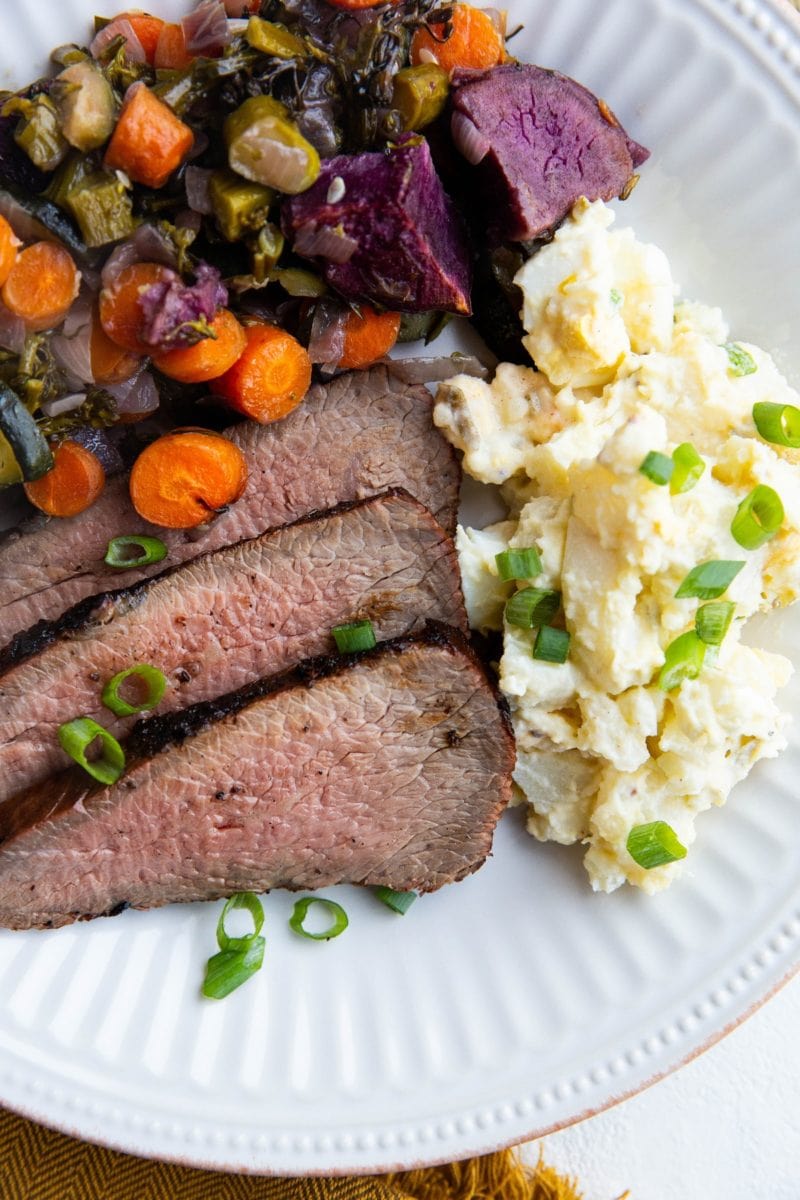

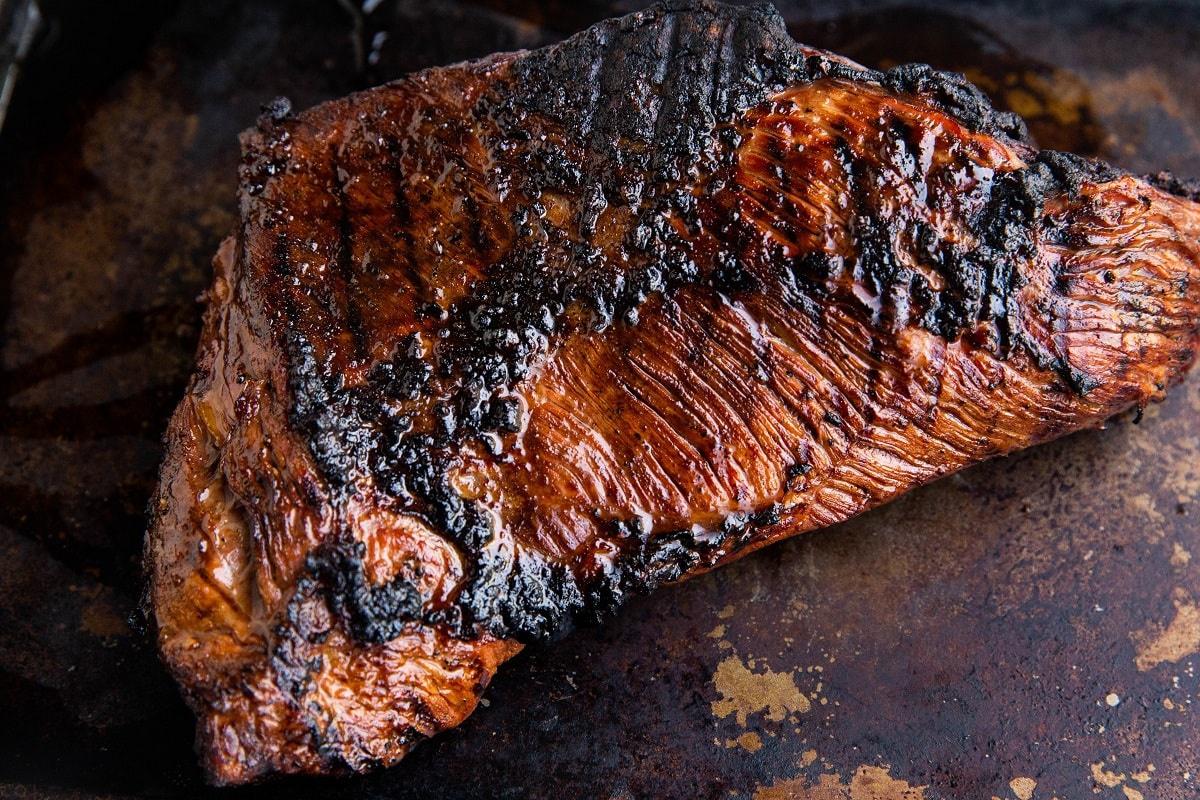
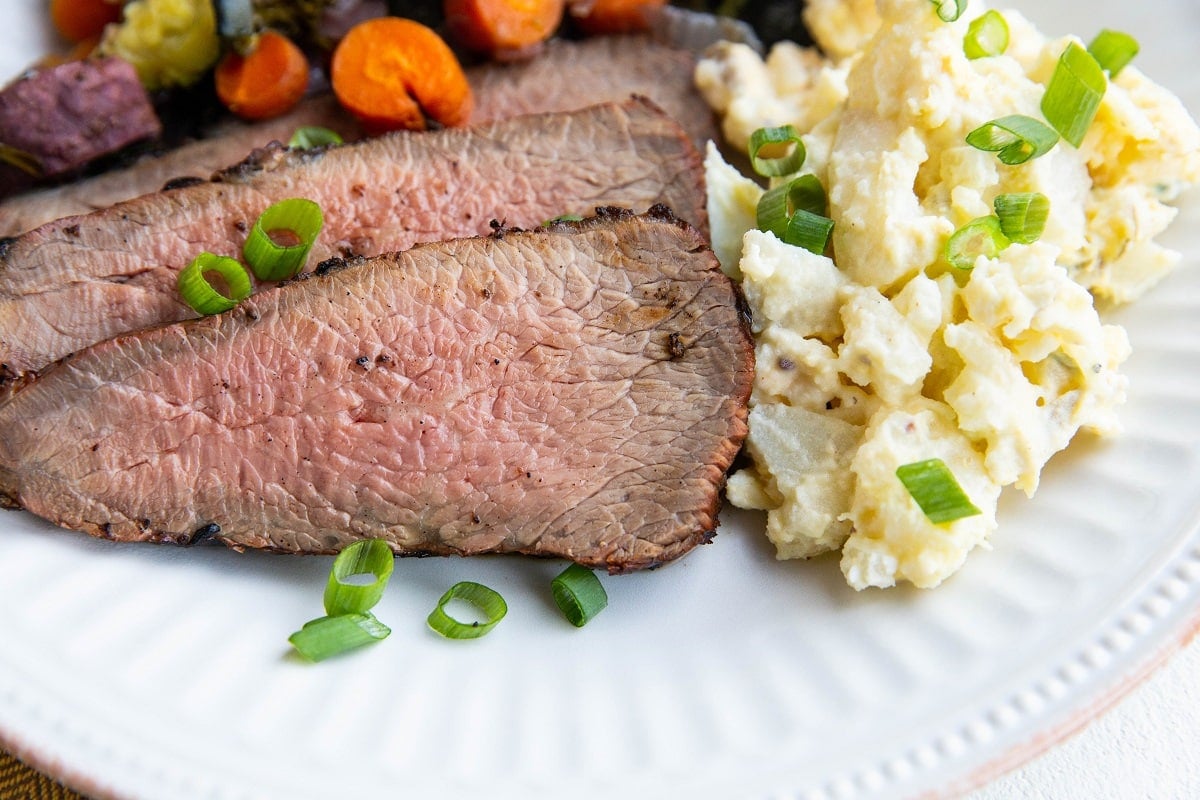


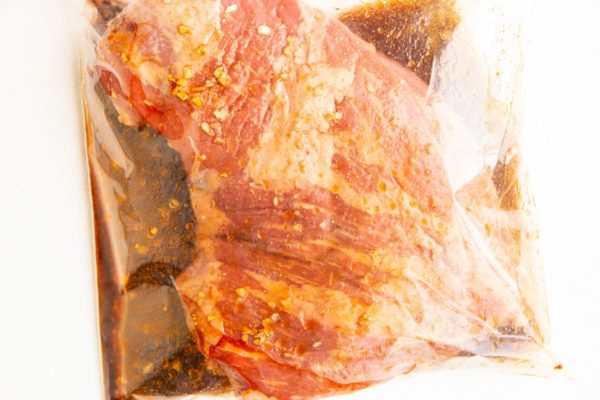




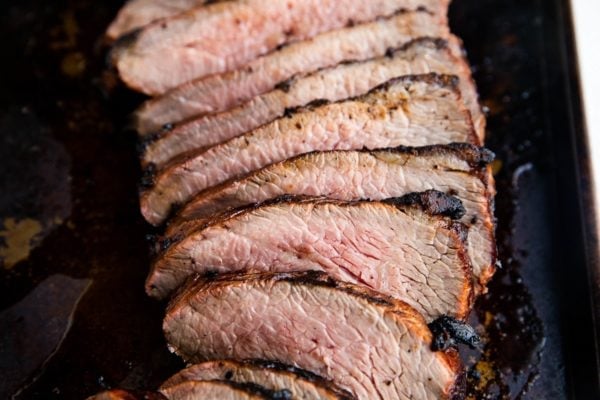


















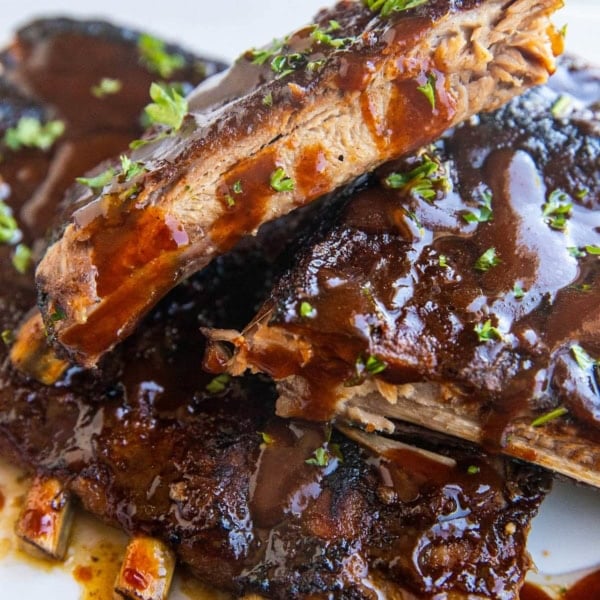


We had this tonight and it was the reason I skipped dessert to have a second helping
LOL The ol’ beef for ice cream tradeoff…that’s how we roll too 😉
We have made this recipe several times, both camping and at home with quests. The results are a flavorful and tender tri-tip that is easy to put together. Definitely a tasty crowd pleaser.
I love the idea of bringing it camping – so convenient and easy!
This is my family’s go-to every time we get together in the summer (and sometimes on the shoulder seasons too!)!! The marinade is truly magical, and the cooking instructions are spot on. Everyone always loves it.
I always love hearing when my recipes become family favorites! Thanks so much for sharing, Rita!
Yes! Great advice for grilling my favorite cut. Originally served to early Californian ranch hands, it’s perfect for either feeding a small group from the grill or just planning ahead for sandwiches. Personally, I’m less ambiguous with regards to method; split-level mesquite charcoal in the classic ufo-shaped Weber is the only way to cook tri-tip. Gas grills don’t get nearly hot enough, nor are they as easy to control in my opinion. One important tip I did not see mentioned here is to always remove any and all marinade/ moisture from all meat prior to cooking. I just grilled a 2½lb. cut a few days ago and it took a solid 40 min. to reach medium. Since charcoal doesn’t last that long, I like to have a chimney starter ready after 20 min. of cook time just in case. I marinate tri-tip with crushed fresh garlic and Worcestershire and glaze towards the end with a simple combination of Worcestershire, ketchup and Sriracha (might sound strange but it’s phenomenal). The camp cooks for the aforementioned ranch hands marinated with either butter or olive oil and fresh garlic, often serving it with a bean salad.
Hi Stacey!
Thanks so much for sharing all of this! I totally agree with you regarding Weber charcoal grills – that’s exactly what we use! I generally mention gas grills too because some people prefer how easy they are. But I agree – in our house, it’s charcoal all the way! xoxo
great recipe – used this for Labor Day family get together – I got a lot of WOWs this is excellent. The marinade and the indirect heat made it tender and yummy
I love that! Thanks so much for swinging back around to share your experience!
Don’t laugh, but in Santa Maria CA the TRI tip is served with…. Macaroni and cheese and it somehow works superbly. Ronald Reagan had the local Elks lodge cook a state dinner for him. Mac n cheese? I dunno…
That sounds fantastic, actually! Next time I make Tri Tip, I’m whipping up some mac and cheese to go with it 🙂
Shhhh!!! I hesitate to tell folks about my favorite piece of beef because I am afraid there won’t be any tri tip at the market when I want it.
I hear ya! I’m always thrilled when I have all the tri tips to choose from 😉